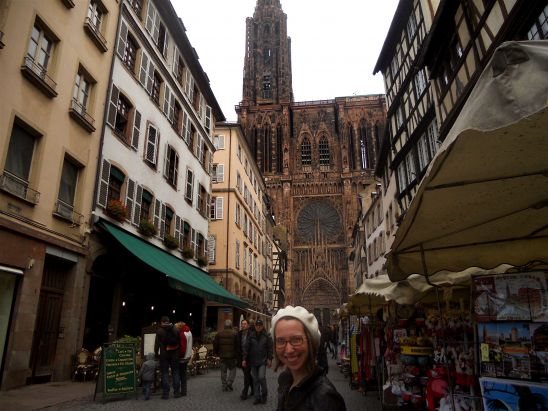A Feminist Catharsis in Strasbourg

My shoulders tense up every time I pass a group of men standing outside a bar, especially when I’m navigating the impossibly narrow sidewalks that line the winding streets of Strasbourg. I lower my head, watching my feet, and try to make myself as small as possible. As I pass the group of men, the guys start to catcall and whistle, and I feel humiliated, but also angry. I am not a piece of juicy meat to be ogled at, and I am aghast at how universally poorly the men treat women in France.
Sometimes when I’m with my friends, they enjoy the attention these men give them. They’ll laugh, or toss their hair and smile, while I scowl and begin my rant against these misogynists. I sound like a broken record every time this happens. “Men can’t treat women this way. It’s appalling. Men would never do this in America because they know we’d kick their ass.” My friends tell me to calm down, and they make a joke about “their little feminist,” as if the only reason I become irate at catcalls is because I’m a feminist. But it’s because I don’t tolerate being treated as anything less than a human being.
I remember the orientation meeting for Strasbourg, back in the spring of my sophomore year. We went over taboos and social behavior so no one made any embarrassing mistakes as soon as we stepped off the plane. A lot of the discussion focused on sexual behavior and gender relations between men and women. We were told to never look a man in the eye that we passed on the street-he would take that for a sign that we were interested in him.
Never accept a drink from a man-that would mean you wanted to go home with him. Never let a man walk you home-that would mean you wanted to have sex with him. All of these veiled symbolic gestures frightened me, because I was afraid I would accidentally do something that would invite a man’s interest in me.
It is an understatement to say we were just a little tipsy, and on top of that, a loud, large group of American women always draws attention, so it was not surprising when a car slowed down and the group of men inside started calling out to us.
Yet what was truly appalling was how a woman’s voice was powerless. In France, it was a woman’s actions that dictated what men would think about her, not what she said. This went against everything I had ever learned growing up-that no matter what you may do or wear, or where you may go, NO means NO.
In France, this was not the case. What made this the most terrifying, was that besides the fact that a woman’s words are dismissed, I didn’t even have the language capability to explain myself in case of a misunderstanding. I could only rely on my actions, which was why I always acted so angrily whenever men catcalled at me. I couldn’t tell them to stop (although they would’ve dismissed my response anyway) so I made it clear through my body language that they better stay away.
One fall evening, after going to a bar, my friends and I decided to walk down the river Ill, which circles the center of the city. It was a gorgeous night, the stars were out, and the cathedral towered over the skyline, lit in glowing orange. It is an understatement to say we were just a little tipsy, and on top of that, a loud, large group of American women always draws attention, so it was not surprising when a car slowed down and the group of men inside started calling out to us.
The men in the car stopped laughing, and the driver slammed his foot down on the gas pedal and the car zoomed away. I turned back to see my friends standing on the sidewalk, grinning wildly and laughing, and they came running to embrace me.
We had only been in France for a month, and none of us had picked up any slang, but because I didn’t understand what the men were yelling, I figured it was probably something derogatory. These men were persistent-their car crawling down the street alongside of us for a good two minutes, yelling loudly and rudely.
Finally, I snapped. There was a month’s worth of anger boiling up inside of me and I let it out. I went up to the passenger side window, which was open, and started yelling in English, “F*** off! You do NOT talk to women this way!” I continued on to explain that women deserve respect, regardless of whether they’re American, French, or any other nationality and threw in a few more expletives for good measure.
The men in the car stopped laughing, and the driver slammed his foot down on the gas pedal and the car zoomed away. I turned back to see my friends standing on the sidewalk, grinning wildly and laughing, and they came running to embrace me. I stood in the middle of this group of women, their arms around me, praising me for my courage and words, and I started to cry. It wasn’t because of the men, but because I had discovered a frightening strength inside of me that I never knew I had, and being surrounded by these women that I loved was like being encircled by a glowing aura of warmth and safeness.
I’ll never know if the men in the car understood me, or if I made any impact on them at all, but I will never forget that incident, because it was the first time I realized that study abroad changed me. Although I don’t think it changed me as much as it showed something deep inside of me that had been trying to get out.
Have you traveled to Strasbourg? We want to hear your story. Email [email protected] for details.








